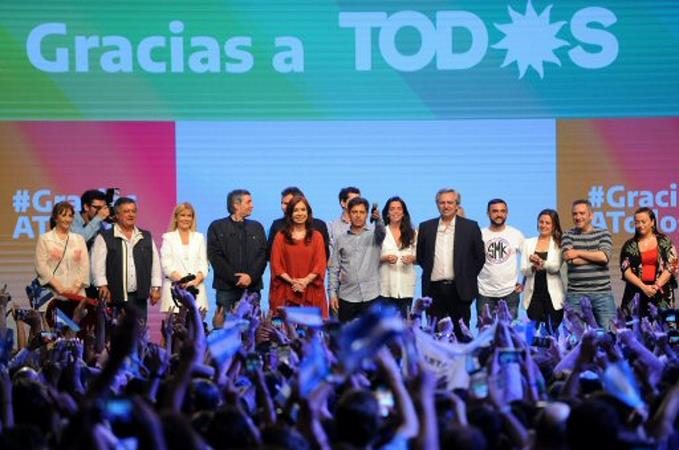
The triumph of lawyer Alberto Fernández, 60, in the elections this Sunday returns to Peronism to power in Argentina at a time when the country is experiencing a serious economic crisis and seizure in Latin America.
With 96.99% of the vote counted, Fernández, of the Frente de Todos, won 48.10% of the votes before President Mauricio Macri, who obtained 40.36%, which is an advantage of almost 8 points, much lower than what the surveys predicted.
Fernández will take the reins of power next December 10 without needing a second round having managed to exceed 45% of the votes.
After knowing the results, Macri congratulated the president-elect and invited him to breakfast at the Casa Rosada on Monday to begin an “orderly transition period, which brings peace to all Argentines.”
Macri, who trusted until the last moment to force a second round in the elections, said that his political training will exercise a “healthy, constructive and responsible opposition.”
In a massive event in the bunker of the Front of All shouting “Alberto, president, Alberto, president”, Fernández said he will meet with the president on Monday to discuss the political transition and promised to “collaborate” because the only thing that The concern is that “Argentines stop suffering once and for all.”
However, Fernández also asked the Government of Macri to be aware of what it leaves and help rebuild the country of “the ashes they have left.”
After knowing the results of the elections and the degree of uncertainty in the markets, the Argentine Central Bank announced this Sunday that it will tighten the exchange restrictions that began to apply last month and impose a new limit on the monthly purchase of dollars, which It will be 200 for bank transactions and 100 in cash.
The measures, which will be detailed this Monday in a press conference, will be valid until December and represent a significant reduction to the limit of $ 10,000 per month that Macri had announced in early September, a few days after the triumph of the opposition in the Primary elections will cause a financial earthquake.
The markets operated last week with high volatility and growing uncertainty about the direction the economy will take and the difficulties in paying the debt and in recent days the dollar rose again and this Friday closed at a record value of 65 pesos per dollar .
The results of the elections that have given the victory to Fernández are the result of a process of unity of Peronism, which was very divided after the defeat he suffered in 2015, and confirm the political polarization in Argentina.
In order to win these elections, as has finally happened, Cristina Fernández, who faces several legal cases for alleged corruption during her administration, gave the presidential candidacy to Alberto Fernández, chief of staff throughout the government of her husband and predecessor, Nestor Kirchner ( 2003-2007), as well as during the first months of his first term.
“What has happened in Argentina, what we see has happened in the sister Republic of Chile, which also happened a short time ago in Ecuador, has to open our heads, not only to political leaders, but to all leaders social, business, the unfeasibility of political and economic models based on permanent adjustment, “said the elected vice president in an act before thousands of followers in Buenos Aires.
During the celebration of their triumph before thousands of supporters, the Fernández also recognized Evo Morales as re-elected president in Bolivia and demanded the freedom of the former Brazilian president Luiz Inacio Lula da Silva.
The president-elect also had words of remembrance for the late former president Nestor Kirchner (2003-2007), whose death is nine years old today.
In spite of the defeat that Macri has suffered in these elections, the fact that he has managed to exceed the percentage of votes he obtained in the primary elections and that Fernández’s victory has not been overwhelming, will allow him to maintain a firm opposition.
The ruling party won the victory in the government of the capital at the hands of Horacio Rodríguez Larreta, but lost that of the province of Buenos Aires, the largest electoral district in the country, where the Peronist candidate Axel Kicillof, Argentine Economy Minister was imposed during the government of Cristina Fernández.
With informatión from ListínDiario.







